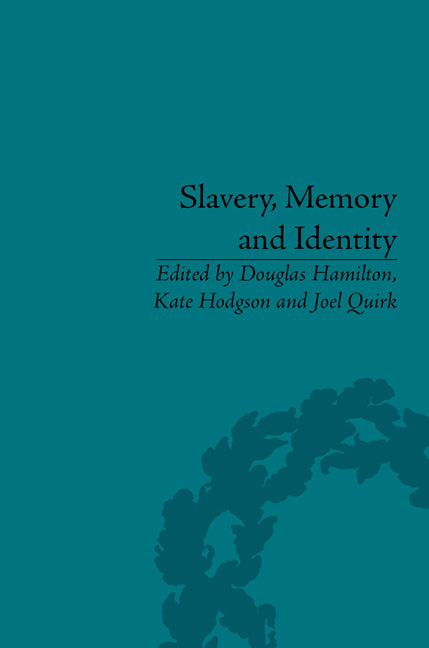Book contents
- Frontmatter
- CONTENTS
- Acknowledgements
- List of Contributors
- Introduction: Slavery, Memory and Identity: National Representations and Global Legacies
- 1 ‘A Thoroughly National Work’: The Politics of Blame and European Abolitionist Identities
- 2 From Slave Quarters to Wigwams: Native American Slaveholding and the Debate over Civilization
- 3 For Civilization's Sake: Legal Abolition of Slavery in Nepal and Sierra Leone in a Global Perspective, 1920–30
- 4 The Heritage of Slavery and Nation Building: A Comparison of South Africa and Mauritius
- 5 Picturing Slavery: The Perils and Promise of Representations of Slavery in the United States, the Bahamas and England
- 6 ‘History Must be Re-Written!’: Revisionist Ambitions among West African Slave Descendants
- 7 Contrapuntal Memories of Slavery and Abolition in the French-Speaking World
- 8 Public Memory of Slavery in Brazil
- 9 Learning to Remember and Imagine Slavery: The Pedagogies of Museum Field Trips in the Representation of ‘Difficult’ Histories
- 10 Slavery and Racism as the ‘Wrongs’ of (European) History: Reflections from a Study on Portuguese Textbooks
- Notes
- Index
3 - For Civilization's Sake: Legal Abolition of Slavery in Nepal and Sierra Leone in a Global Perspective, 1920–30
- Frontmatter
- CONTENTS
- Acknowledgements
- List of Contributors
- Introduction: Slavery, Memory and Identity: National Representations and Global Legacies
- 1 ‘A Thoroughly National Work’: The Politics of Blame and European Abolitionist Identities
- 2 From Slave Quarters to Wigwams: Native American Slaveholding and the Debate over Civilization
- 3 For Civilization's Sake: Legal Abolition of Slavery in Nepal and Sierra Leone in a Global Perspective, 1920–30
- 4 The Heritage of Slavery and Nation Building: A Comparison of South Africa and Mauritius
- 5 Picturing Slavery: The Perils and Promise of Representations of Slavery in the United States, the Bahamas and England
- 6 ‘History Must be Re-Written!’: Revisionist Ambitions among West African Slave Descendants
- 7 Contrapuntal Memories of Slavery and Abolition in the French-Speaking World
- 8 Public Memory of Slavery in Brazil
- 9 Learning to Remember and Imagine Slavery: The Pedagogies of Museum Field Trips in the Representation of ‘Difficult’ Histories
- 10 Slavery and Racism as the ‘Wrongs’ of (European) History: Reflections from a Study on Portuguese Textbooks
- Notes
- Index
Summary
Sierra Leone and Nepal have ‘twin towns’. Sierra Leone's capital city, Freetown, and Amalekhgunj (meaning Freedom Place) in Nepal were both founded to resettle freed slaves. Freetown was established in 1792, Amalekhgunj in 1929, and both share a place in the history of the abolition of slavery. This chapter examines the history of freedom from slavery in both countries, looking closely at the decade in which slavery was legally abolished in both Sierra Leone and Nepal to show how the abolition of slavery remained a benchmark in the early twentieth-century discourse of civilization and modernization. The main locus of this discourse was the League of Nations but, as the example of Nepal shows, the League could reach beyond its official scope and have its debates shaped (and sometimes initiated) by nations outside its membership. On a local level, arguments for legal abolition were remarkably similar in both countries, especially in the absence of the voices and experiences of the slaves themselves. Rather than concern over the fate of slaves, legal abolition of slavery was a signifier of both a nation's civilization and a key part of their international reputation.
Historical Contexts
Sierra Leone's unique history as a project of the British anti-slavery movement shaped and defined both its history and its international reputation. An Economist article in 2008 illustrated this reputation: ‘Originally a pioneering colony of freed British slaves, Sierra Leone has as much right as Philadelphia or Paris to be thought of as a cradle of modern liberty.’ Sierra Leone's claim to be ‘a cradle of modern liberty’ lies in the principles behind its foundation. In May 1787, Thomas Clarkson, Granville Sharp and Philip Sansom co-founded the Society for Effecting the Abolition of the Slave Trade in London and devised a plan to resettle ex-slaves and their descendants in Africa and chose Sierra Leone as the ideal location. The plan was taken over by the newly formed Sierra Leone Company which established Freetown in 1792. Settlers there, however, expressed their antipathy towards British policy with a revolt against Sierra Leone Company in 1800.
- Type
- Chapter
- Information
- Slavery, Memory and IdentityNational Representations and Global Legacies, pp. 45 - 62Publisher: Pickering & ChattoFirst published in: 2014



